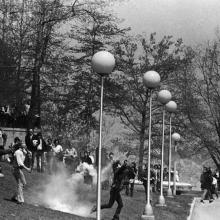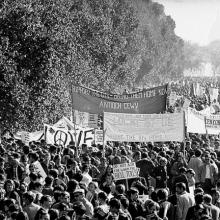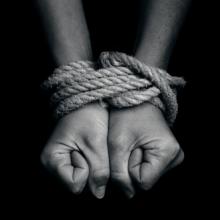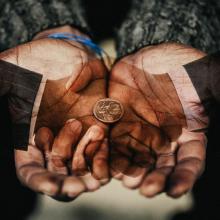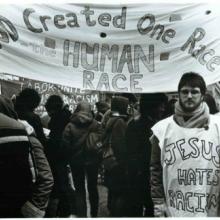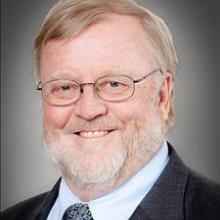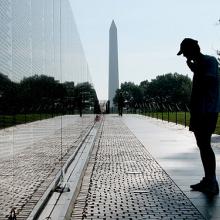Vietnam War
Monday, May 4, was the 50th anniversary of the Kent State shootings. Thirteen students were shot and four killed by the Ohio National Guard during a Vietnam War protest after the invasion of Cambodia. On that day, I was a student up the road at Michigan State University, helping lead Vietnam protests there. It all felt very personal. It still does.
HE UGLY agony of Indochina is made all the more tortuous by the delusive refusal of this nation to accept the culpability for decades of a morally indefensible policy whose final failure is now being revealed.
The urge to believe that we have done what was somehow right and honorable leads us to wash our hands of any sin and then search to place on others the responsibility for the failure of American policy. So the administration blames the North Vietnamese for violating a treaty that was never initially respected by the South Vietnamese.
Times reporter Edward B. Fiske observed how conservative evangelical Protestants supported the war. Many, like the theologian and editor of Christianity Today, Carl F. Henry, believed it to be morally defensible. Fiske wrote that “the majority of laymen and clergy in this country” were more in agreement with Carl Henry than with William Sloane Coffin.
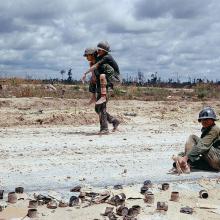
Image via manhhai/Flickr
At no point did I see a Niebuhrian “just war.” The entire enterprise was a moral disgrace.
Some of my friends have been talking about giving up the “evangelical” label, because of what it has come to be associated with, in this year’s political campaign. I’m not ready to make that move. I spent a good part of the 1960s trying hard not to be an evangelical, but without success.
When I marched for civil rights during my graduate school years, I helped to organize “ban the bomb” marches and protested the Vietnam War. I was clearly out of step with much of the evangelicalism of the day.
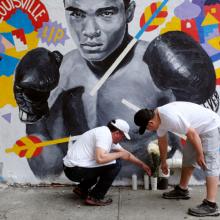
Image via REUTERS/Lucas Jackson/RNS
When boxing star Cassius Clay declared himself a member of the controversial Nation of Islam back in 1964 and demanded to be called by his new name, Muhammad Ali, he shocked the world of sports and rattled a nation already struggling with social unrest over civil rights and the Vietnam War.
But Ali’s conversion also launched a pilgrimage of faith that would take him from the fringes of Islam through its orthodox heart, and from a virtual pariah to a global ambassador for faith — his own and others — as the key to peace.
AN UNQUENCHABLE demand for sex, coupled with an endless supply of vulnerable children, creates a seemingly endless cycle of child exploitation.
During the Vietnam War, the U.S. Department of Defense contracted with the Thai government to provide “recreation and relaxation” for U.S. soldiers. Sex tourism was organized and expanded into a major industry. Today, sex tourism is a huge source of income for Thailand: The country remains a hub for tourists who can get anything they want at a very low price. Many children are trafficked into Thailand from surrounding countries or are fleeing military genocide. Others are pressured by their own family members to contribute to the household income. Uneducated and hopeless, these desperately poor boys and girls help feed the sex trade industry’s insatiable hunger for children.
A friend of mine recently traveled to Thailand. “I’d read books and watched documentaries about the sex industry in Thailand,” says Jennifer Laine VanBeek. “But nothing prepared me for Bangkok. Even beyond the red light districts, the sex trade is impossible to ignore. I was defeated by the sheer volume, the visible presence, the young ages of the exploited girls and boys, and how engrained it seemed to be in Thai culture.”
Jennifer visited Thailand—often called “Disneyland for Pedophiles”—with her Westmont College friend Rachel Goble, president of The SOLD Project, an organization that works to prevent child exploitation. Early in 2008, Rachel moved to Thailand’s Chiang Rai region, whose lush landscape and laughing children belie the harsh reality: Generations of women from this village have been and continue to be exploited by Thailand’s sex trade.
“GOD CREATED the world and we created borders.”
That obvious recognition was shared at a recent consultation in Quito, Ecuador, between North American and Latin American churches on “Faith, Economy, and Migration.” Felipe Adolf, president of the Latin American Council of Churches, shared that conclusion on how issues of migration and reform are global and not just local.
It’s very easy to see the problems confronting our nation and feel as though the challenges facing the rest of the world are simply too much to bear. Continuing poverty and unemployment, discrimination of all kinds, and wars and rumors of wars fill our newsfeeds, papers, and TV screens. But it’s naïve and narrow to think this way. Many of the threats we face are global in nature and don’t know any boundaries. Through our economies and consumption habits, media, travels and migrations, and for Christians in particular our faith, we are inextricably connected with men and women around the world. It’s always been important, but now especially so, to think globally when it comes to faith and justice.
Sojourners has a long history of doing this very thing. We started as a little group of two kinds of people—those who had grown up conservative evangelicals and were deeply frustrated with the lack of attention to issues of justice and peace, and those who had just come to faith from the student movements and counterculture of the 1960s and ’70s. We met at Trinity Evangelical Divinity School and began to study and pray through the scriptures about injustice, war, and poverty. The Vietnam War was raging, and we were looking for a biblical understanding of the events of our time.
The only way to win the “war on poverty” is for liberals and conservatives to make peace — for the sake of the poor. That would be the best way to mark the 50th anniversary of the war on poverty, declared by President Lyndon Johnson in his January 1964 State of the Union address. Making peace means replacing ideologies with solutions that actually solve the problems of poverty. With both Republicans and Democrats speaking out on poverty this week, and the recession slowly receding this should be an opportunity to find the focus, commitment, and strategies that could effectively reduce and ultimately eliminate the shameful facts of poverty in the world’s richest nation.
For any proposal, the basic question must be whether it helps more people and families rise out of poverty and realize their dreams. This means setting aside political self-interest and thinking beyond our too often inflexible ideologies.
Time was when a determined minority vowed to change the nation’s collective mind about racial integration and the Vietnam War.
I was in that minority. We considered our cause just. We called our tactics “civil disobedience,” “grass-roots organizing,” “protest,” “civil rights,” “saving America.”
It’s a bit disingenuous now for us to lambaste a conservative minority for wanting the same leverage and for using the same tactics. “Civil disobedience” can’t be relabeled “obstructionism” just because the other side is using it.
JIM BALMER, president of an addiction-recovery center called Dawn Farm in Ypsilanti, Michigan, has been an antiwar activist since the Vietnam days. His engagement with nonviolence has taken him to some unexpected places, from the antiabortion group Operation Rescue to working with addicts. Sojourners associate editor Elizabeth Palmberg interviewed Balmer early last year at the Consistent Life conference in Washington, D.C.
Elizabeth Palmberg: What was your work for peace during the Vietnam war?
Jim Balmer: I had been part of Detroit-area draft resistance. I went through almost all the conscientious objector status [process]. And it was 1970—what can I tell you? I was under the influence of substances one night, and I wrote the draft board in Pontiac, Michigan, and told them off; I just said, "come and get me." They never did. I suspect that, as the '70s progressed, they got more and more tired of putting us in jail.
The Detroit-Ann Arbor area was a hub for political activism. Students for a Democratic Society was founded there. YPFJ—Youth for Peace, Freedom, and Justice—there were all sorts of organizations. We would protest. The first time I got actually picked up was at a George Wallace rally—Wallace was a terrible, racist candidate from Alabama.
I started being interested in nonviolence. I was reading Mohandas Gandhi and Martin Luther King Jr., and I took King's nonviolence pledge when I was in high school.

The 1971 Pulitzer Prize-winning photo by John Paul Filo of the Kent State Shootings. Via Wylio http://bit.ly/IJoqIS.
May 4, 1970 -- 42 years ago today -- was the day protesting the war in Vietnam became serious.
On April 30, 1970 President Nixon had announced an invasion of Cambodia, seeking to destroy North Vietnamese and National Liberation Front operations in the border area. Protests spontaneously broke out at universities all over the country.
On May 4, National Guardsmen fired on a group of protesting students at Kent State University in Ohio, killing four and wounding nine. Jeff Miller, Allison Krause, Bill Schroeder, and Sandy Scheuer became casualties of the war. A presidential commission later concluded that the shooting was "unnecessary, unwarranted, and inexcusable."
From Sojourners CEO Jim Wallis' eulogy at Scott Kennedy's funeral last weekend:
"Oh Lord, Lord, Lord…. This is a hard one.
You know why we are all gathered here today—Because Scott Kennedy, your good and faithful servant, has always brought us together—to do good things in the world: Necessary things, visionary things, courageous things, and often hard things. But they were things that must have warmed your heart, because they were the things that make for peace.
Jesus told us. ‘Blessed are the peacemakers, for they shall be called the children of God.’ And Scott brought us together, time and time again, to be those peacemakers and thus, really, to be your children—by doing what we were supposed to do.
And now, Scott is with you….and has likely heard you say something like, ‘Well done good and faithful servant.’ But we miss him terribly, and we weren’t ready for this. We just thought we would always have him.
Scott never brought us together for himself; it was never about him, but always about being peacemakers for the sake of other people. But today we gather for Scott. He has brought us together once again, and what a crowd it is—both here and online all around the world. We are all Scott’s peacemakers...."
For the uninitiated, "Alice's Restaurant Massacree" (that's its official name) is a folk classic, an epic musical monologue from Arlo's 1967 album also called "Alice's Restaurant." it tell the mostly-true story of Thanksgiving Day, Nov. 25 1965 in Stockbridge, Mass., when then-18-year-old Guthrie and his friend Richard Robbins, 19, were arrested by police officer William "Obie" Obanhein for illegally dumping garbage at the town dump that was closed for the holiday. Two days later, they pled guilty in court before a blind judge.
Despite all that I knew 40 years ago about the policy and politics of the Vietnam war, I learned much more by simply listening to veterans. Late at night, often in bars, I heard about the war from the experience of those who fought it. And that taught me more than everything I had ever read. With tens of thousands of vets coming home from Iraq in the next two months -- and many more returning from Afghanistan over the next two years -- we'll have plenty of opportunities to say thanks, and then just listen.
| The Daily Show With Jon Stewart | Mon - Thurs 11p / 10c | |||
| Mexed Out | ||||
| ||||
How ironic that for all the protests going on about unemployment these days that a parallel debate is occurring in our agricultural sector: What to do about a shortage of workers to pick crops or care for livestock on U.S. farms.
Two long pieces this weekend described "one hell of a killing machine," and "the dark matter
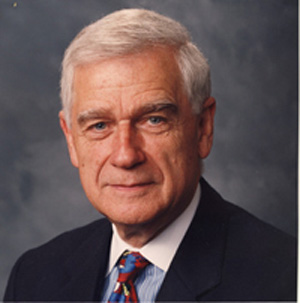 Mark O. Hatfield's political witness shaped a whole generation of students, teachers, pastors, and social activists in the evangelical community and beyond. The voice of Christians today who plead for social justice and peaceful alternatives to war would not have emerged with its strength and clarity in the 1970s without his leadership. His death underscores the vacuum of such spiritually rooted voices uncompromising in their commitments to peace and justice within the cacophony political rhetoric today.
Mark O. Hatfield's political witness shaped a whole generation of students, teachers, pastors, and social activists in the evangelical community and beyond. The voice of Christians today who plead for social justice and peaceful alternatives to war would not have emerged with its strength and clarity in the 1970s without his leadership. His death underscores the vacuum of such spiritually rooted voices uncompromising in their commitments to peace and justice within the cacophony political rhetoric today.
One of my life's greatest privileges and joys was to work as an assistant to Senator Mark O. Hatfield for nearly a decade, from 1968 to 1977. I saw first-hand what courageous leadership, combined with unswerving compassion and civility, looked like within the political life of that turbulent and formative era. Those experiences are shared in my book, Unexpected Destinations (Eerdmans).
